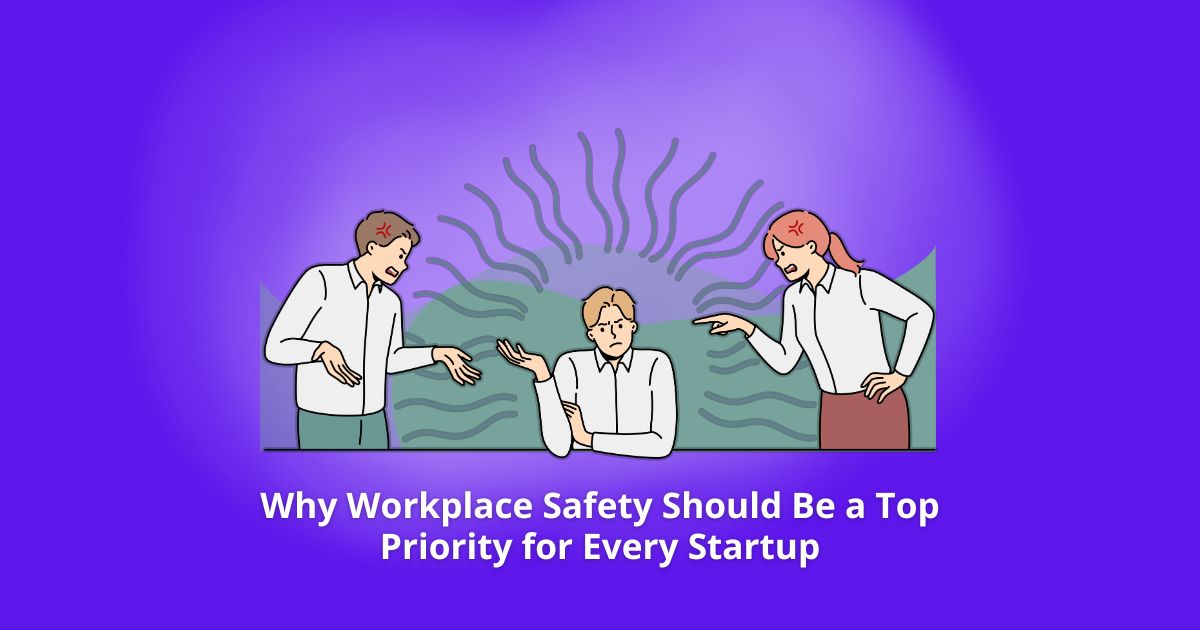In the fast-paced world of startups, there’s a tendency to prioritize rapid growth, product development, and scaling operations. However, one critical aspect often gets overlooked amidst the drive for success: workplace safety. While it may seem like a concern reserved for more established companies, safety protocols are just as vital for startups, if not more so.

Ensuring that safety is ingrained into a company’s culture from the beginning protects employees and fosters an environment of trust and productivity. One especially crucial area is training on jobsite violence, which plays a significant role in maintaining a secure and respectful workplace.
The Unique Challenges of Startups
There are several significant aspects of differentiation between startups and other companies. They are often smaller, more maneuverable and have lower budgets for the process. It is expected to find a need for more resources, with founders and employees performing multiple tasks. Such an environment may cause an organization to focus more on innovation and growth while neglecting other critical areas like safety measures.
However, the lack of strict formalization in many startups can lead to certain risks. The lack of well-organized human resources departments, proper training programs and policies, and safety measures means there is always a potential for accidents, injuries, and conflicts. Such a setting can also mean that the employees will experience more stress due to the fast pace and pressure that comes with the job, making the workplace potentially risky.
There is also a misconception in many startups that safety applies more to fields like construction or manufacturing because risks are more tangible. However, physical assault is not the only issue; workplace violence, harassment, and other verbal threats are also very dangerous, especially in white-collar organizations. Failing to address these risks results in legal consequences, loss of reputation, and demoralized employees, eventually hindering growth.
The Importance of Training
Workplace safety is not only the absence of physical injuries but also a set of policies that aim to minimize dangers employees may experience at the workplace. In some cases, providing adequate employee training is considered one of the most critical factors that can contribute to improving workplace safety. This training should encompass all aspects of the workplace, including safety measures and handling emergencies, conflicts, and violence.
Training on job site violence is therefore crucial, even in organizations primarily office-based or operating in virtual environments, such as startups. Workplace violence can range from a verbal confrontation to a physical confrontation of varying degrees. These risks are not unique to any company, and being a startup, the pressure is often high, which can lead to escalation of these issues. Through training the employees on the likelihood of violence in the workplace and how to handle it correctly, the startups are likely to reduce the cases of violence in the workplace.
In addition, this type of training aids in developing a culture of respect and responsibility. When the employees know that there is no tolerance for violence in the workplace, they are in a better position to report any concerning activities before it gets out of hand. Such occurrences can be avoided through early intervention so that they do not cause physical or psychological injuries to employees.
Developing a Safety Culture
The first and foremost approach to ensuring that safety is a key priority in the startup is to establish a solid safety culture at the early stage. This implies that safety should be a core value and a strategic objective in the company. Managers have to set a good example and ensure that they spend a lot of effort and money ensuring that safety measures are put in place.
Establishing a safety culture entails more than having the policy to follow. It needs constant interaction and sensitization. Training sessions, workshops, and safety drills effectively ensure that employees are fully aware of the company safety policy. It also refers to the need to establish a culture that allows employees to freely report safety issues or safety violations within the organization without punishment. Such open communications allow potential risks to be communicated and resolved before developing into more advanced and severe complications.
The Long-Term Benefits
Ensuring the safety of employees is not only about preventing injuries; it is about positioning your startup for success in the future. In such an environment, one is likely to be engrossed in his or her work, and hence, productivity is fostered. This can result in increased levels of innovation and collaboration, which are crucial elements for a startup’s growth.
Also, those companies that place a high value on safety will likely retain most of their workers. As we understand, more and more people are starting to fight for the same position at the company. People need not just a salary but also to work for an employer that is concerned about their welfare. Creating a safe and supportive environment in the workplace is one of the critical strategies that can help to secure the best people.
Conclusion
Thus, for those startups that aim at long-term success, implementing measures that would increase workplace safety from the very start is crucial. Through safety training, mainly training on jobsite violence, startups can safeguard their employees and enhance workplace safety.
Implementing a safety culture ensures that risks are minimized and assists organizations in attracting and maintaining employees, thus achieving long-term productivity and profitability. Ensuring that employees are safe at the workplace is not just a legal issue, but a strategic business element that would benefit startups in the current market.